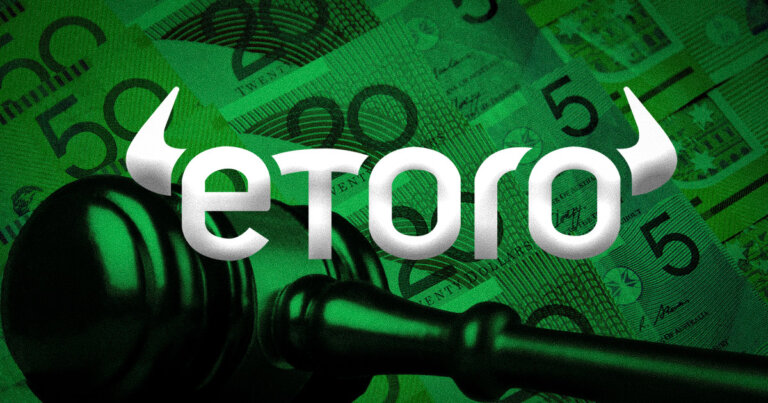 Australia ASIC sues eToro alleging lax oversight of crypto derivatives, causing consumer losses
Australia ASIC sues eToro alleging lax oversight of crypto derivatives, causing consumer losses Australia ASIC sues eToro alleging lax oversight of crypto derivatives, causing consumer losses
Financial watchdog ASIC clamps down on eToro over broad CFD target markets

Cover art/illustration via CryptoSlate. Image includes combined content which may include AI-generated content.
The Australian Securities and Investments Commission (ASIC) has filed a lawsuit against the online trading platform eToro for allegedly violating financial regulations related to cryptocurrency derivative products, leading to two-thirds of CFD traders reportedly losing funds.
ASIC vs. eToro
According to the concise statement filed by ASIC, eToro is accused of contravening the design and distribution obligations under the Corporations Act 2001 from Oct. 2021 to July 2023.
ASIC Deputy Chair Sarah Court expressed disappointment over the alleged breaches by eToro, given it is reputation, commenting,
“ASIC is disappointed by the alleged lack of compliance in this case, given eToro’s market penetration and the depth of its brand awareness, both in Australia and globally.”
Court stressed that Contract For Difference (CFD) target markets should be narrowly defined due to the significant risk that retail clients may lose all their deposited funds. Court added that CFD issuers must comply with the design and distribution obligations and “cannot simply reverse engineer their target markets to fit existing client bases.”
A CFD is a type of derivative that lets buyers and sellers agree to pay each other the difference between the opening and closing prices. The buyer makes money if the price goes up, and the seller makes money if the price goes down.
Specifically, ASIC accused eToro of defining its CFD target market too broadly. For instance, a retail client with a medium-risk tolerance but no experience in investing or understanding of the risks of trading CFDs still fell within the target market.
eToro responds to ASIC statement
An eToro spokesperson told CryptoSlate,
“eToro AUS is considering the allegations filed by ASIC in these proceedings and will respond accordingly. There is no impact or disruption of service for clients of eToro AUS and no material impact on eToro’s global business.’
The spokesperson also confirmed that “eToro AUS is now operating with a revised target market determination in place for CFDs,” detailing that the allegations focus on 5 Oct. 2021 to 29 July 2023.
eToro reaffirmed its commitment to adhering to the applicable rules and regulations in all jurisdictions where they operate. Being regulated by financial authorities worldwide, the company stresses its close collaboration with regulators, aiming to ensure consumer protection while also balancing the need for access for individual investors.
The spokesperson also asserted eToro’s desire to continue operating in Australia, stating,
“Led by our local team in Sydney, we are committed to growing our business in Australia as well as to providing our existing Australian users with the best possible customer experience.”
Specific allegations.
The lawsuit ultimately centers around eToro’s purported target market determinations, which ASIC claims were inadequate in defining the types of retail clients suitable for trading CFDs.
Furthermore, ASIC alleges that eToro’s screening tests for retail investors were very difficult to fail and offered limited utility in excluding customers for whom the CFD product was not likely appropriate. ASIC argues that eToro’s screening tests were ineffective and allowed unsuitable investors to trade CFDs, exposing them to significant losses.
The CFDs in question allowed investors to speculate on the price movements of various underlying assets, including cryptocurrencies, forex, commodities, and stocks. ASIC contends that CFDs are not suitable for most retail investors, given the complexity and leverage involved.
ASIC has previously taken administrative action to protect consumers from high-risk CFD trading unsuited to their financial circumstances. Examples of such activities include stop orders against Saxo Capital Markets and Mitrade Global Pty Ltd.
Over 60% of investors lost money.
During the period in question, eToro had nearly 30,000 retail clients trading CFDs. ASIC’s statement notes that the majority, around 19,601, suffered realized losses totaling over AUD 26 million. Specific figures show over 9,800 eToro CFD clients stated they had no financial knowledge, while over 11,000 said they had never traded with leverage previously.
ASIC contends eToro contravened its obligations as a financial services licensee by failing to act efficiently, honestly, and fairly. The regulator alleges eToro did not make a genuine attempt at an appropriate target market determination and applied an inadequate screening test that resulted in consumer harm.
The regulator’s design and distribution obligations (DDO) require firms to design financial products that meet the needs of consumers and distribute those products in a targeted manner. A target market determination, a key requirement under DDO, is a mandatory public document outlining the class of consumers for which a financial product is likely best suited.
The regulator is seeking penalties, compliance orders, and costs from eToro. eToro has not yet commented publicly on the lawsuit. The case will be heard in the Federal Court of Australia.
For consumers seeking guidance on financial decision-making, ASIC’s Moneysmart provides trusted tips, tools, and guidance to support Australians with everyday money decisions, including more information about the risks and complexities of CFD trading.
It represents the latest regulatory scrutiny of cryptocurrency trading platforms amidst growing concerns over consumer protection in the digital asset sector. Regulators globally are increasingly focused on ensuring investor safeguards are in place.
























































